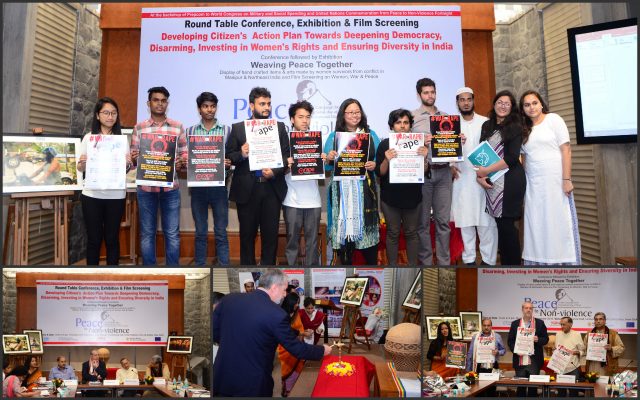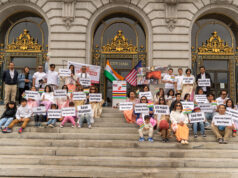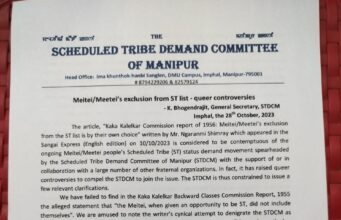27th September 2016 , New Delhi – World spend $ 1.6 billion on arms yet social expenditure is decreasing. At the backdrop of Prepcom to World Congress on Military and Social Spending and United Nations Commemoration from Peace to Non-Violence Fortnight, Control Arms Foundation of India along with Manipur Women Gun Survivors Network in collaboration with United Nations Information Centre, Delhi & EU held a successful Round Table Conference on “Developing Citizen’s Action Plan Towards Deepening Democracy, Disarming, Investing in Women’s Rights and Ensuring Diversity in India on 22nd September 2016 at United Nations, New Delhi.
Addressing the opening function as Chief Guest, Prof. Muchkund Dubey President of Council for Social Development, Former Ambassador and Former Indian Foreign Secretary, speaking at the panel discussion at United Nation Information Centre said the cult of arms spread due to their fluidity and called the process to an end. He also emphasised that basic needs can be fulfilled if government reaches the level of fundamental rights. Education is a fundamental right to life yet 2000 schools have been closed in India.
Further he said that the budget expenditure should be in the favour of the population. There may be a justification to meet the external threat but no justification for the country to arm itself against its own people.
Mr. Sanjiv Nair, Director, Northeast Center for Technology Application & Reach (NECTAR), drew on his vast experience and told about the government initiatives for increasing the income level of Northeast people by using technology and looms. He further mentioned that government of India has constructed more than 12,000 schools there in Chhatisgarh. Peace is going to come from education and economic stability in Northeast India.
Mr Rajiv Chandran, National Information Officer, United Nations Information Centre, stated that this 12 day campaign that the Information Centre has been organizing is an opportunity to look at a different continuum of peace, development and human rights. It is the weaving of different institutions of democracy that leads to strengthening of peace. Presenting the UN Secretary General Ban-ki Moon’s address he said that peace is much more about keeping aside arms. There is a need to protect this planet and only by working together the ethos of Sustainable Development Goals can be achieved.
Mr. Johann Hesse, Head of Cooperation, EU Delegation to India talked about conflict and women’s rights and told how EU after World War II came into existence as a peace project. He also spoke on the existence of racial discrimination, caste discrimination, and natural resources. He stated that human rights are one of the core areas of EU and EU is committed to Sustainable Development Goals to move forward.
Binalakshmi Nepram, Founder, Manipur Women Gun Survivors Network and Secretary General of Control Arms Foundation of India, drew on her extensive experience and pointed out that every 22 minutes a woman is raped. The situation of women is deteriorating. Budget for women and child development was reduced to half. She reiterated the need to ensure money of a nation is spent in peace rather than war.
She further said that we are at 69 years of India’s Independence but we still are at 108 of gender index. How to reach the sustainable development Index to bridge the gap. There is no dearth of resources we need to ask how to use the resources appropriately.
A panel of esteemed guests, including Mr. Ravinder Pal Singh, Peace and Security Analyst, Mr. Jawed Alam Khan, Senior Research Officer, Centre for Budget and Government Accountability (CBGA), Ms. Kanika Kaul, Senior Programme Officer, head of Gender Responsive Budgeting (GRB), Centre for Budget and Government Accountability (CBGA), Dr. Krishna Menon, Professor, Gender Studies, Ambedkar University, Dr. Siddharth Tripathi, Assistant Professor, Lady Shri Ram College, DU, Ms. Sanhita Ambast, International Legal Advisor, South Asia, International Commission of Jurists, Ms. Anju Talukdar, Director, MARG, Dr. Lianboi Vaiphei, Assistant Professor, Indraprastha College, Delhi University, and Dr. Kaushikee, Associate Prof. Nelson Mandela Centre for Peace & Conflict Resolution, Jamia Millia Islamia.
This panel discussion was also followed by an exhibition “Weaving Peace Together”. The exhibition includes beautiful paintings, photographs, handloom and handicraft products by Manipuri artisans and craftsman such as Manipuri shawls, ‘enaphi’ (Manipuri dupatta), hao phannek (Manipuri wrap around), leiroom (hand woven scarf) , Kuki Shawls and Manipuri Shawls, traditional hand bags etc which signify the vibrant and rich crafts and artistic skills of the Northeast region.
Based on discussion at a round table, the conference participants made the following recommendations for a Citizen’s Action Plan (CAP), as follows:
- Return to Gandhian principles of truth and non-violence by forging social transformation at the socio-economic-cultural and political level to achieve the objectives of unilateral disarmament
- Strategies including Preventive and peaceful solutions for all conflict situations
- Priority for all forms of gender in both the Union and State budgets needs to be stepped up through Gender Sensitive Budgeting
- Focus on a culture of dialogue than on a culture of violence
- Constitutional values and Universal Declaration of Human Rights as a basis for deepening democracy, Ensuring diversity and women’s rights in India
- India must have a National Diversity Policy
- Recognition of women role in peace processes and ensuring the participation of women as decision makers in peace negotiations and present and post conflict reconstructions by both the Central and State Governments
For any questions for clarifications, kindly contact
Office of Control Arms Foundation of India/ Northeast India Women Initiative for Peace
B B5 / 146, Safdarjung Enclave, New Delhi-110029, India
Phone: +91-11-46018541 Fax: +91-11-26166234
Web: www.cafi-online.org












